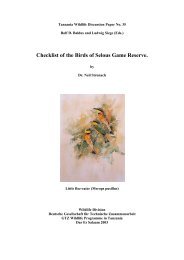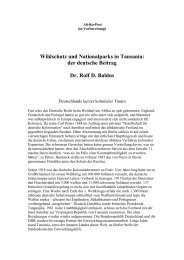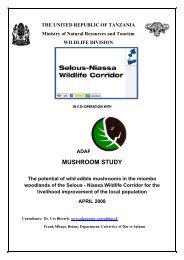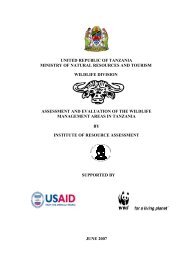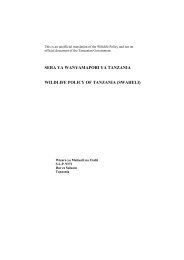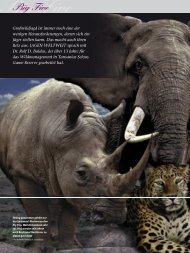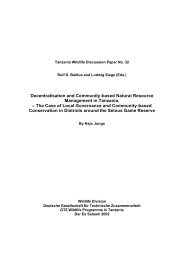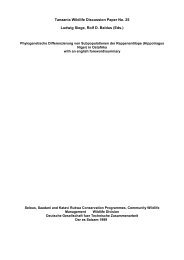African Indaba Articles - wildlife-baldus.com
African Indaba Articles - wildlife-baldus.com
African Indaba Articles - wildlife-baldus.com
You also want an ePaper? Increase the reach of your titles
YUMPU automatically turns print PDFs into web optimized ePapers that Google loves.
We note that Packer’s proposal for lion hunting certification does not include any mention of this lastissue. This is a critical omission, as the future of lions, and lion hunting, is largely an economic one. Wherelions are able to produce high returns to local landholders, which equal or exceed their high costs, they willhave the best chance of surviving. Where locals continue to suffer costs that exceed the benefits of livingwith lions, no matter how effective hunting <strong>com</strong>pany monitoring and anti-poaching investments are, the lionsare likely to disappear. The same economic equation holds for the prey species that the lions depend on.Few issues could be more urgent to the hunting industry in Africa than moving towards more viable lionconservation practices that start with giving local landholders rights to manage and benefit from thesedestructive but valuable animals.Although many vested interests in governments and private sector are likely to resist independentcertification, we note that informal means of ‘certification’ are already being used. Namibia’s recent successat CITES CoP 13 in having its hunting and <strong>wildlife</strong> trade proposals for rhinos and elephants approved resultslargely from the international <strong>com</strong>munity ‘rewarding’ Namibia for sustainable management practices whichhave led to increasing <strong>wildlife</strong>. Countries where <strong>wildlife</strong> is declining are less likely to find favor amonginternational regulatory bodies for their trade requests; Namibia has been ‘certified’ whereas Tanzania mightnot be.The practicality, both political and technical, of developing certification schemes for trophy hunting mayprovide a concrete agenda around which discussions of trophy hunting’s sustainability and reform cancoalesce. Many lessons have been learned in the past decade from similar efforts to certify forest andmarine products. Key questions in applying this to <strong>wildlife</strong> might include: What should certification consist of? What are the appropriate bodies to determine criteria and grant or deny certification? How might such efforts be made most effective and accepted by a wide range of stakeholders?Aldo Leopold, the American conservationist who formulated many of the basic principles of gamemanagement in the 1930’s, said that “conservation will ultimately boil down to rewarding the privatelandowner who conserves the public interest.” In Africa today, the countries that have succeeded inempowering and ‘rewarding’ private landholders through control over <strong>wildlife</strong> and its values are those whichhave the most sustainable <strong>wildlife</strong> management systems and trophy hunting industries. A <strong>com</strong>bination ofcollaborative policy reform efforts and independent certification schemes for well-managed countries andoperations will give hunting in Africa the best chance of flourishing in the face of its many threats andchallenges.The authors are from Sand County Foundation Community Based Conservation Network, TanzaniaProgram, Box 8372, Arusha, Tanzania; contact Fred Nelson fnelson@habari.co.tzTanzania: Reduce the Quotas or Reform?By Andrew CauldwellIn a recent discussion, a professional hunter, referred to here as Fred, stressed that the WildlifeDepartment must reduce the hunting quota, particularly for lion and buffalo. Fred observed that hunters inblocks adjacent to his own were hunting too many lion and as a result were shooting young specimens thathad not yet developed into good trophies. Research has shown this can be very detrimental to lionpopulations. Fred also observed a shortage of mature buffalo bulls. He attributes this trend to the fact that 80buffalo having been killed as trophies legally last year in two neighbouring concessions. From Fred’sperspective, reducing the quotas appears to be the easy solution to what he considers “over-harvesting”,however there are other perspectives.In Tanzania, the current <strong>wildlife</strong> management system puts the realizable financial in<strong>com</strong>e from trophyhunting by visiting hunters in direct dependency to the number and species hunted within a given concession46



